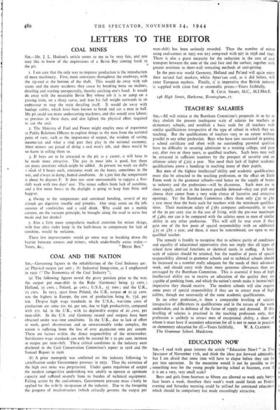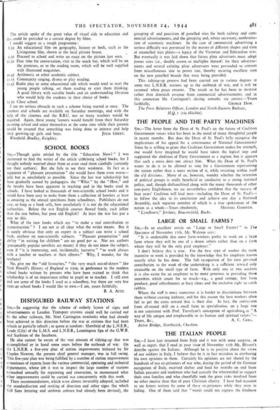-. EDUCATION NOW
Sut,—I read with great interest the article "Education Now? " in The Spectator of November 17th, and think the ideas put forward admirable, but I am . afraid that some time will have to elapse before they can be put into operation. In the meantime would it not be possible to do • something now for the young people leaving school at fourteen, even if it is on a very, very small scale?
Boys and girls from fourteen to fifteen are allowed to work only forty- four hours a week, therefore their week's work Gould finish on Friday evening and Saturday morning could be- utilised for continued education which should be compulsory but made exceedingly attractive.
The article spoke of the .great value of visual aids to education and This could be provided to a certain degree by films.
I would suggest as a rough programme: 8.3o An educational film on geography, history or both, such as the Livingstone film, shown at the local picture house.
9.3o Proceed to school and write an essay on the picture just seen. 10.3o Free time for conversation, visit to the snack bar, which will be on • the premises, or to the reading room, which will be well supplied with illustrated magazines.
10.45 Arithmetic or other academic subject.
11.15 Community singing, drama or play reading.
:1.45 Radio play or some educational talk which would tend to start the young people talking, set them reading or start them thinking. A good library with suitable books and an understanding librarian who would help the students' in their choice of books.
12.30 Close school.
I see no serious obstacle to such a scheme being_ started at once. The cinemas and schools are available on Saturday mornings, and with the help of the cinemas and the B.B.C. not so many teachers would be required. Again, these young 'teeners would benefit from their Saturday morning school and enjoy themselves at the same time while their parents would be assured that something was being done to interest and help



























 Previous page
Previous page